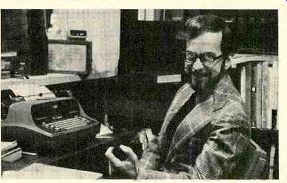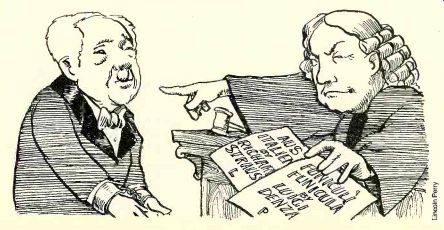
by JAMES GOODFRIEND
RIP-OFFS: ONE MORE TIME
FOLLOWING several columns on the subject and numerous other mentions of it in these pages, letters and cards about musical rip-offs have been buzzing about our offices like flies in the marketplace on a summer afternoon. I have been asked to reinforce my condemnation of rock plagiarizing from the classics, and I have been asked to condemn plagiarism in the case of classical composers as well ("pinching folk melodies"). I have been asked with what justification I condemn such as Emerson, Lake and Palmer when the results of what they do are so invaluable (?), and when, it is assumed, I would defend the equivalent practice in the context of classical music. I have been told to accept the whole thing as a natural condition of music-and of the world-and I have been asked to please shut up about it all.
I have a certain sympathy with that last re quest, but the buzzing around the office doesn't permit it. Besides, I think, on the basis of the letters received, there is an awful lot of confusion on the issue. I am no pundit, but I think I see the situation clearly enough to function possibly as an arbiter.
Point one: plagiarism, as a matter of morality, is the use of someone else's invention without giving him the proper credit. A rip-off is the same thing. But it is also a rip-off, even if credit is given, if what is done with the other man's work is to make it less than it was be fore you got your hands on it. Handel, who was probably the greatest appropriator of other people's ideas in the history of music, in variably improved whatever he took. A few popular composers have managed to produce something on about the same level as the original work they took it from, but most have merely managed to whittle an inferior pop song or rock composition from what was originally a masterpiece. That is a rip-off, category two.
WHICH leads us to point two: using some body else's melody is not necessarily a rip off; it depends upon how it is used and why.
Deliberate quotation, for example, is not plagiarism, for the listener is expected to recognize the source and to react to its placement in a new context. Thus Tchaikovsky did not plagiarize the Marseillaise in his Overture 1812, and Berlioz did not plagiarize the Dies irae in his Symphonie Fantastique, and the Beatles did not plagiarize the Marseillaise, In the Mood, and Greensleeves in All You Need Is Love (thank you, Steve Simels).
Nor are variations on a theme whose source is acknowledged necessarily plagiarism. No one in his right mind would contend that Vaughan Williams' Fantasia on a Theme of Thomas Tallis is a steal from Tallis, or that Delius' Brigg Fair is a rip-off of that rather well-known folk song. Ditto Beethoven's Dia belli Variations, Kodaly's Dances from Galanta, all the Bach chorales, and innumerable other pieces. And certainly the very titles of Copland's Billy the Kid and El Salon Mexico and Tchaikovsky's Capriccio Italien openly acknowledge their composers' debts to folk
songs. No one is trying to get away with any thing here.
Point three: even beyond acknowledgment of sources, or lacking it altogether, plagiarism is rarely an issue in classical music because what is involved is invariably a melody, and melody is only a part of a classical work. Only one instance of real classical plagiarism comes easily to mind. Giovanni Bononcini submitted to the Academy of Ancient Music in London as his own composition a madrigal that proved to be a simple transcript of a work by Antonio Lotti. He was found out and roundly disgraced. Had he taken merely Lotti's melody no one would have cared. Had Emerson, Lake and Palmer taken merely a melody no one would have cared. They might even have been praised for what they did with it-if they did anything with it.
But what Emerson, Lake and Palmer, Waldo de los Rios, and other hacks have lifted is not melodies but entire compositions, to which they have added little except a rhythm section, changing virtually nothing but the instrumentation and the length. This is clear-cut plagiarism when composer credit is claimed for the final product, and generally a rip-off, in the second sense, even when it is not.
When the original work happens still to be in copyright, it is legal plagiarism as well (as in The Barbarian).
And so, point four: using somebody else's melody if it's copyrighted and you don't have permission and he catches you at it, is legally plagiarism. Here it doesn't matter at all how you treat the melody, what you make of it, or why you did it. You can feel morally pure and still get clipped for damages, for the law is not interested in aesthetics but in ownership. It happened to Richard Strauss. He quoted what he naively thought was a folk song in his Aus Italien. The song was Funiculi Funicula, and it was written by Luigi Denza only six years before. Denza sued and won; Strauss paid.
In popular music, a fair number of song writers have ended up paying royalties to other songwriters, and many more would have but that the copyright on the earlier work (if there ever was one) had run out. That doesn't mean that pop musicians are more dishonest than classical musicians. Rather, it goes back to two things. The first is, as mentioned be fore, that in classical music the melody is only a part of the work, whereas in a pop song the melody is the music. And second, that it's sometimes impossible to tell, in the misty state called inspiration, whether you are creating something or merely remembering something.

AND so we come to the unconscious rip-off, and classical music, I admit, is big on that: Beethoven's Eroica theme appeared first in Mozart's Bastien et Bastienne, and the "Ode to Joy" theme in a minor sacred work by Mozart. Debussy's La Damoiselle Elue features a theme from Grieg's Piano Concerto. And most sublime (and pitiful), the half-mad Robert Schumann wrote down a theme he said was dictated by angels; sadly, it turned out to be an imperfectly remembered melody from his own Violin Concerto. Still, not all such anticipations are causal, and the line between memory and coincidence is also difficult to draw. If one really wanted to force the issue he could take up what my friend Leonard Alt man occasionally proposes-with a wicked look in his eye-as a fit subject for a Ph.D. thesis: Bach Precedents in the Dead Sea Scrolls.
Also see:
EDITORIALLY SPEAKING, WILLIAM ANDERSON
LETTERS TO THE EDITOR (Feb 1977)
THE TOKYO AUDIO FAIR: A report on breakthroughs, trends, and approaches (Feb. 1977).
AUDIO QUESTIONS and ANSWERS: Advice on readers' technical problems, by LARRY KLEIN
EQUIPMENT TEST REPORTS: Hirsch-Houck Laboratory test results on the: JVC JR-S600 AM/FM stereo receiver, Marantz Model 1250 integrated stereo amplifier, KLH Model 354 speaker system, and Micro Seiki DDX-1000 turntable and MA-505 tonearm
Source: Stereo Review (USA magazine)